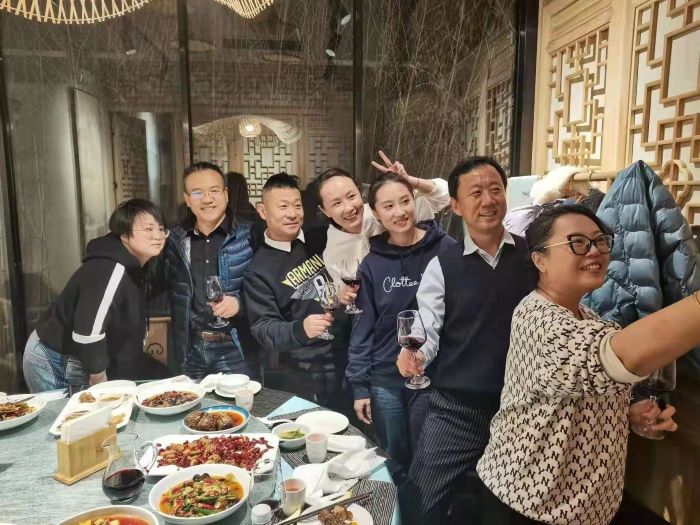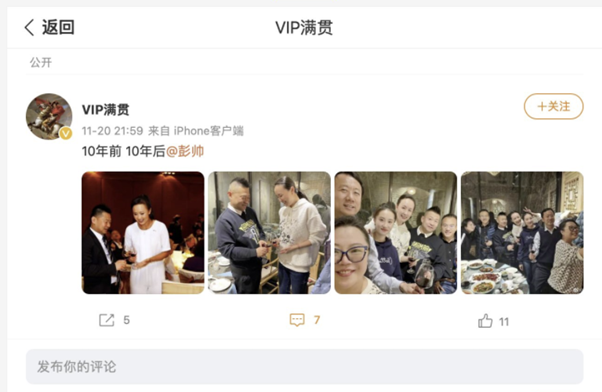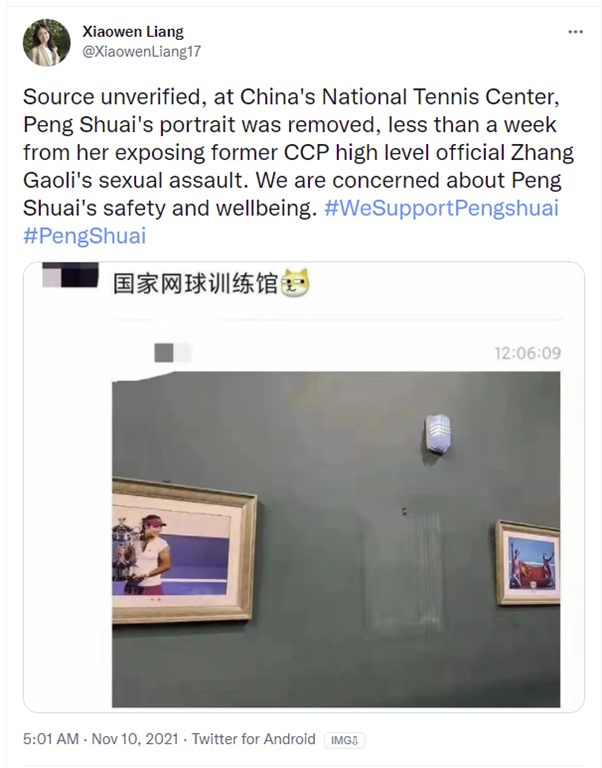Did China fake the coverage of tennis star Peng Shuai?

Analysis of footage of tennis star Peng Shuai released by Chinese state media indicates that government officials may have orchestrated the coverage.
On 2 November, Peng used Chinese social-media site Weibo to accuse former Chinese vice-premier Zhang Gaoli of sexual misconduct. The post was removed from the platform within 20 minutes. Following the allegations, Peng’s wellbeing became a concern when officials from the Women’s Tennis Association said they had been unable to contact her. That led to global reports of her possible ‘disappearance’.
The Chinese government has received sustained, high-profile criticism for allegedly silencing her, including calls for the cancellation of the 2022 Beijing Winter Olympics.
Suspicions about her safety and the Chinese Communist Party’s involvement in her silence grew when a ham-fisted email was released by state media outlet China Global Television Network. Said to have been written by Peng, it was sent to WTA chief executive Steve Simon.
The email said Peng was at home resting and that her allegation against Zhang was false. There’s doubt about the email’s authenticity. For example, analysts have noted that the screenshot of the email lacked a date, header or signature but, on the third line, included a cursor, suggesting it was taken before the email was sent or as it was being drafted in a text document.
Chinese state media have since released additional posts purportedly confirming Peng’s wellbeing. Photos of Peng in her house, seemingly shared on her WeChat story, emerged online via state media. These included two of Peng with her cat, presumably taken by a second person, and one selfie-style photo.
On 20 November, Peng was filmed dining at a restaurant linked to the Chinese government in her first public appearance since her allegations were censored. Hu Xijin, editor of the state-run Global Times, tweeted videos showing Peng at the restaurant. Other images and footage were posted on Twitter, which is blocked in China, and have not been widely reported inside China’s ‘Great Firewall’.
Another video released by Hu showed Peng at the opening ceremony of the Fila Kids Junior Tennis Challenger Finals in Beijing.
These videos mark Peng’s only public appearances and show that she has been in the constant company of at least three government officials when in public. Such sightings being reported only by state media, rather than on Peng’s personal account, have added to suspicions.
This is one of the most severe blocks by the state in recent years, with information released for international eyes only. Censorship was most obvious during CNN’s broadcast about Peng’s disappearance, when the feed in China ‘lost signal’.
Peng’s only other appearances have been on video calls with the International Olympic Committee. She was seen talking to IOC president Thomas Bach, Athletes’ Commission chair Emma Terho and an IOC member in China, Li Lingwei, in November. She claimed then to be ‘safe and well’. A second video call was reported on 2 December, though this appears to have been a private discussion of support options for her, rather than a discussion of the allegations.
The authenticity or otherwise of these videos is key to assessing if the CCP and state media were involved in a cover-up. Many believe they are intended as ‘proof of life’ to debunk claims that Peng is under the authorities’ control. Accordingly, it’s worth establishing the identities and backgrounds of those she’s pictured with.
Two videos were released of Peng purportedly ‘having dinner with her coach and friends in a restaurant’, according to Hu. The first shows Peng sitting with a group of people chatting at a table. Multiple references are made to the date. Zhang Junhui, China Open’s tournaments director, asks, ‘Isn’t tomorrow November 20?’ Someone corrects him, saying that tomorrow will be the 21st, and he then repeats that date.
The second video shows the entrance of the restaurant with the date partially in view on a cleaning sign. It then cuts to Peng entering the building with Ding Li. Ding is president of the sports division of Beijing-based lighting and display company Leyard, as well as the legal representative and senior executive of German World Sports (Beijing), also known as Global-D Sports.
Li Xiaobin, secretary of the party branch and president of China Open, was also at the table. Three women are visible but have not yet been positively identified, which may indicate that they’re Peng’s friends rather than officials. Hu claimed Peng was with her coach, yet no reference to any of these individuals coaching her exists.
These videos were accompanied by others of the restaurant meeting, including one from Ding. In a tweet, he refers to the location as the Beijing Yibin Guest House, which is minutes away from the government’s Zhongnanhai HQ and Ministry of State Security and adjacent to Tiananmen Square. In another, he refers to the ‘Beijing Wanghong Restaurant’, referencing its reputation as a popular eatery for officials and influencers.
Open-source analysis of the footage, matched with images of the restaurant (largely provided by the public via reviews), confirms it was the Yibin Guest House. Public records reveal that the restaurant’s primary shareholder is the People’s Government of Yibin City, Sichuan Province. The building is part of a government-owned network of accommodation and working space for officials and dignitaries.
The awkward conversation, and the frequent references to the date, spurred suspicions that the meal was staged.
Additional images were posted on Twitter and Weibo by Ding (@ li_ding1, the first tweet from his account in more than four years). Peng and Ding appear to be long-acquainted, with Ding sharing an image of the pair drinking wine 10 years earlier. Another image indicates they’ve known each other for at least 12 years. Ding has insisted that Peng is not constrained.

Ding Li’s Weibo post highlighting his history of knowing Peng Shuai. The low engagement on the post is noteworthy given Peng’s prominence, suggesting that it may have been censored or unlisted within China.
Ding’s Twitter presence has drawn suspicion, including his criticism of the WTA for its public involvement in calling out Peng’s disappearance.
Approached by the BBC, Ding vehemently denied that there had been a sexual assault and said there was no investigation into Peng’s allegations. He has also spoken on Peng’s behalf multiple times, including saying that she declined the offer to be interviewed by the British broadcaster due to her life being ‘significantly impacted’ by calls for interviews.
A third video, posted by Shen Shiwei, international news editor at CGTN and a Global Times columnist, shows eight people sitting at the table, six of whom are facing the camera. The seventh person, believed to be Ding, is seen briefly from the rear. An eighth person is seen only in a reflection; they don’t appear in any of the images posted by Ding. The cameraman, described by Shen as Peng’s friend, is unidentified. This individual may be present at other events attended by Peng and is a key person to identify. A ninth person is seen crouched in front of the cameraman.

Frame of video posted by Shen Shiwei reveals an eighth ‘friend’ at the table (blue rectangle). A ninth person filmed the encounter, and a tenth person is seen crouching in front of the cameraman. These individuals were not visible in any of the other videos and the latter two do not appear to have eaten at the table.
Zhang, Peng, Li and Ding were together at the tennis finals the next day.
Shen claimed that Peng contacted Simon to criticise the 2 December suspension of tournaments in China. Shen has regularly acted as a spokesman for Peng, but his comments have not been verified.
It has been claimed, though not verified, that the authorities have removed Peng’s photograph from a wall in the National Tennis Training Centre.

Analysis of the images and footage leaves unanswered questions about Peng’s situation. However, the awkward presentation and the unnatural emphasis given to the timing of encounters suggest they may have been staged to ease international pressure on the China Open and the government.
The censorship of Peng’s account, coupled with censorship of the larger story on the Chinese internet, shows these events were for international eyes only, in the face of mounting pressure on officials to demonstrate Peng’s autonomy.
Peng has now told a Chinese-language media outlet in Singapore that she had never accused anyone of sexually assaulting her. She said comments she made on social media had been misunderstood. ‘First, I need to stress one point that is extremely important, I have never said or written that anyone has sexually assaulted me,’ Peng said.
The WTA later issued a statement saying it still wanted a full, fair and transparent investigation, without censorship, into Peng’s original allegation.